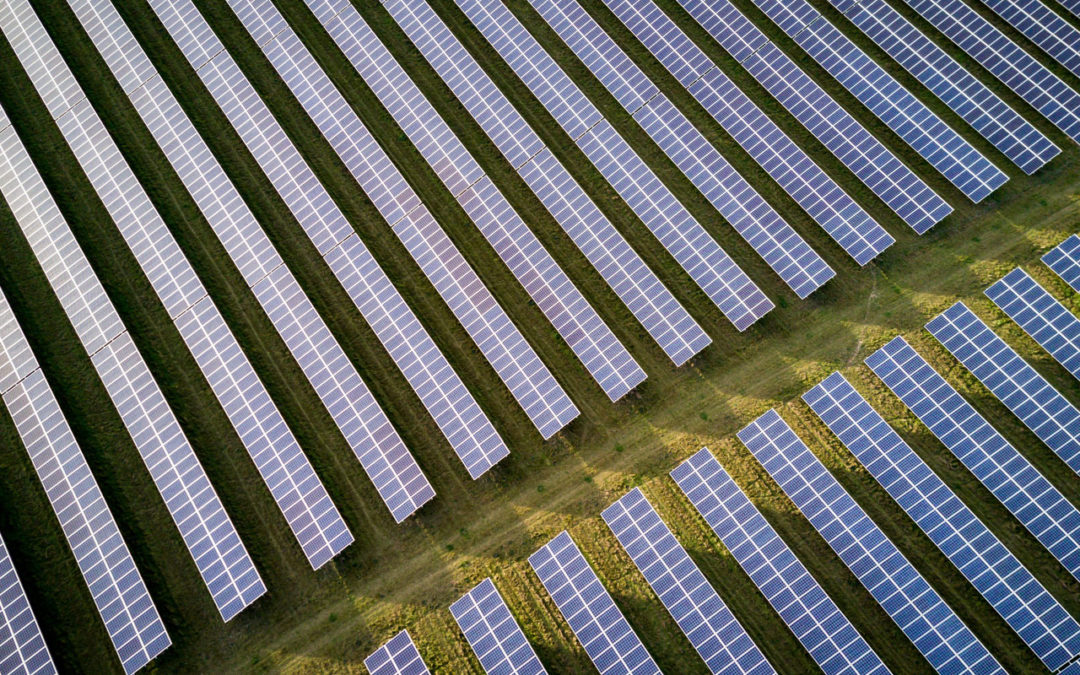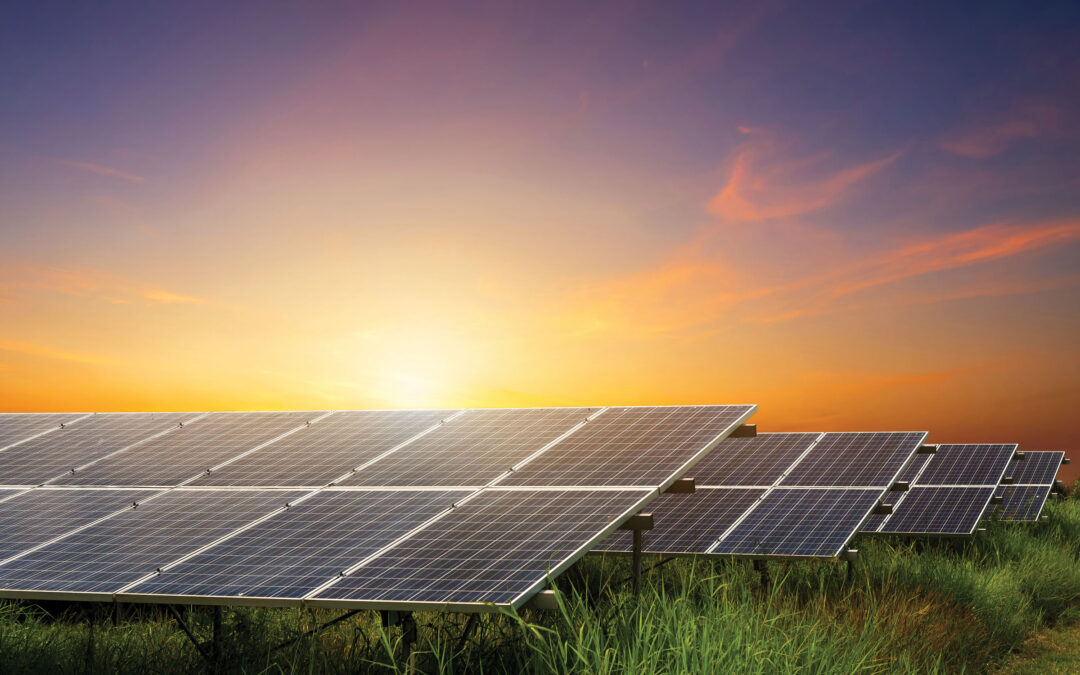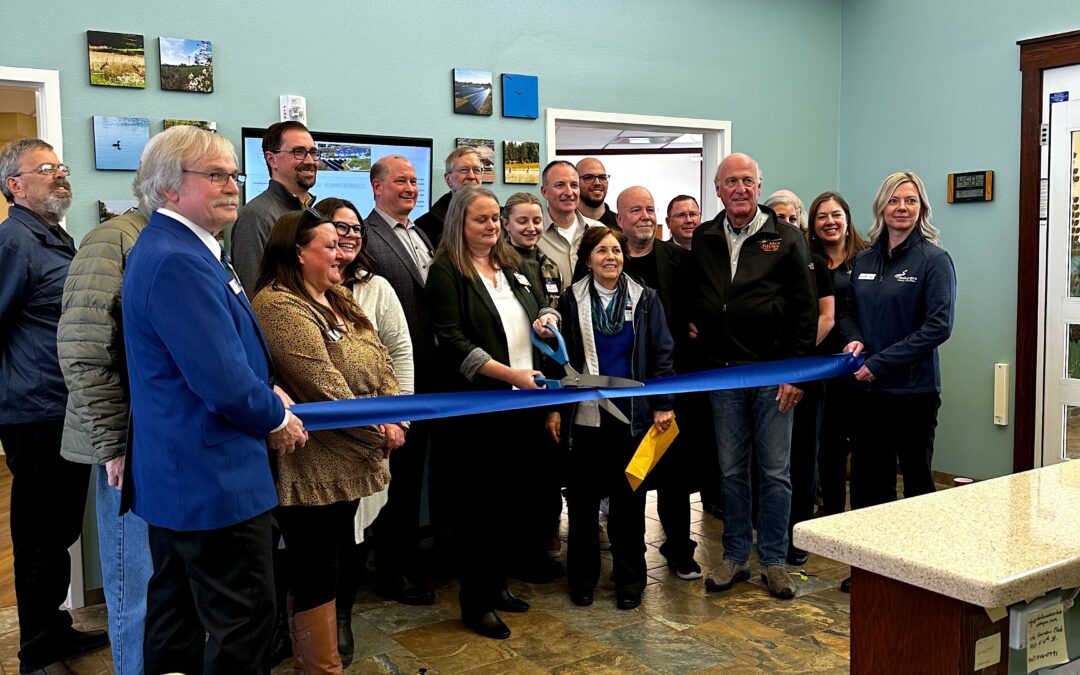
by Lauren Cohen | Mar 22, 2023 | Solar, Solar for Good
On Tuesday, March 21, Sheboygan Senior Community (SSC), Inc. held a solar dedication ceremony for their 198-kilowatt, newly constructed solar array. Sheboygan Senior Community is a faith-based, nonprofit continuum of care facility providing respite, short-term rehab, assisted living, skilled nursing, and end-of-life services.
The project, installed by Arch Electric, consists of 448 solar panels and will produce roughly 267,000 kWh of annual energy. It is projected to offset over 28% of the organization’s current consumption. Unlike many other solar projects, Sheboygan Senior Community’s array was installed as a ground mount on approximately 1.5 acres.
“What sets the Sheboygan Senior Community Project apart from any other commercial solar project in Wisconsin is the battery or energy storage system,” says Keith Conway, Energy Consultant at Arch Solar. “This system is designed to shave peak demand charges from the utility, thus reducing their monthly electric bill. The SSC is setting an example of what is possible to the rest of the state.”
This project was brought to fruition largely due to a generous commercial benefactor, who provided 95% of the funding for the senior community’s project. The organization worked with Legacy Solar Cooperative to secure this funding. By using a private investor, they were able to utilize the 26% Investment Tax Credit which was unavailable to not-for-profit organizations before the passage of the Inflation Reduction Act.
“Legacy Solar Cooperative has been very pleased to work with everyone on this wonderful project. It does indeed take a village,” says Tony Hartman, Director of Business Development at Legacy Solar Cooperative. “SSC’s leadership team especially made this project a joy, from start to finish, showing consideration for their neighbors as well as campus residents.” In addition to facilitating the financial arrangement, the cooperative provided consulting services, education, and outreach assistance.
The Sheboygan Senior Community also received a panel grant from RENEW Wisconsin’s Solar for Good program. The grant provided 150 of the 448 solar modules necessary for the project. “SSC, Wisconsin’s Office of Energy Innovation Grant Program, the Couillard Solar Foundation, Arch Solar, and key local support brought this fantastic clean energy and battery project to life, demonstrating patience through the pandemic period,” continued Hartman.
“Renewable energy is not only the right thing to do for the environment and our community, but it provides SSC with the opportunity to enjoy substantially lower utility bills for years to come,” says Stephanie Goetz, Director of Operations at Sheboygan Senior Community. “These savings will go towards expanding our campus to continue filling the needs in our community for senior living services. Our hope is that our Solar for Seniors project can be used as an example for other healthcare nonprofit organizations.”
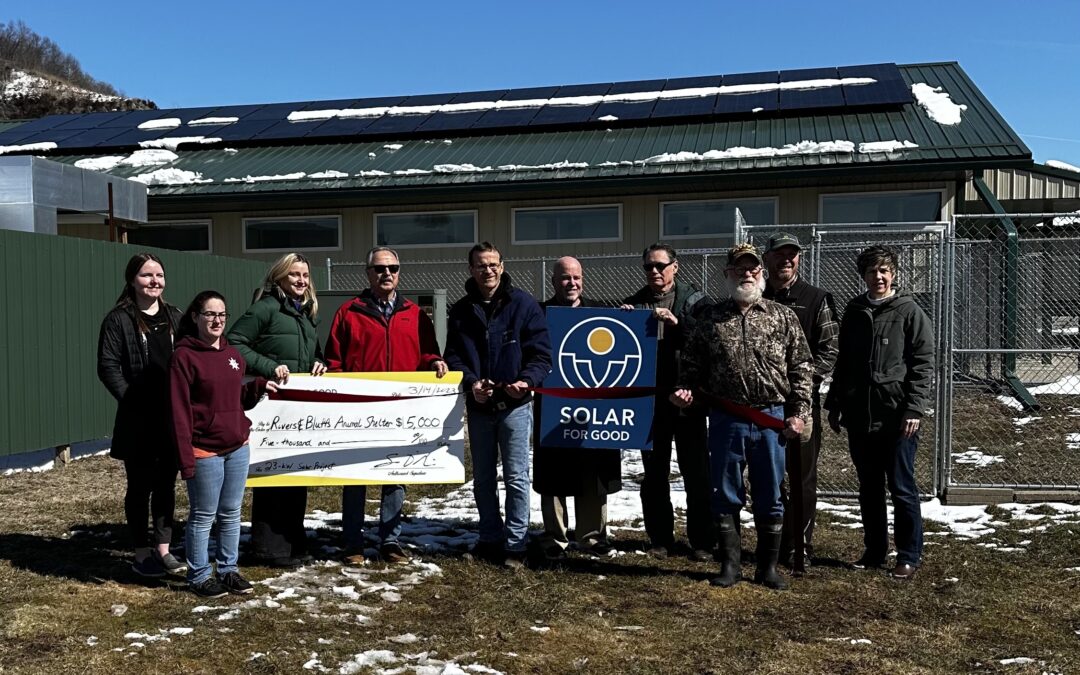
by Lauren Cohen | Mar 20, 2023 | Solar, Solar for Good
On Tuesday, March 14th, Rivers and Bluffs Animal Shelter held a ribbon cutting ceremony for their 23-kilowatt, newly constructed solar array. Rivers and Bluffs Animal Shelter is a non-for-profit organization that provides quality care for companion animals in need and educates the community about responsible pet ownership.
The project, installed by Olson Solar, consists of 54 solar panels and will produce over 24,000 kWh of annual energy. It is projected to offset approximately 97% of the animal shelter’s consumption.
This project marked Olson Solar’s first array to be installed on an animal shelter. “With an expected lifespan of 35-40 years, their system will produce more than $100,000 in energy savings,” said Michael Palen of Olson Solar Energy. “The clean renewable energy produced by their system is equivalent to saving over 46,000 gallons of gas!”
The decision to invest in the future of their shelter with solar was made possible due to a generous donation made in late 2021. This donation, coupled with the shelter’s continued increases in energy consumption, presented an opportune time to “go solar”.
“Anything we can do to reduce our operating costs is an example to all who support us that we are doing our part by investing wisely in our animal shelter,” said David Ralph, board member of Rivers and Bluffs Animal Shelter.
In addition to the donation, RENEW Wisconsin’s Solar for Good program provided Rivers and Bluffs Animal Shelter with a $5,000 grant to assist with the upfront costs of the solar array. The project also received funding assistance through Focus on Energy incentives.
“Renewable energy projects like these can be a huge help to the community,” said Sam Dunaiski, Executive Director of RENEW Wisconsin. “Rivers and Bluffs will be able to take the money saved on their utility bills and immediately redirect it into caring for animals in the community.”
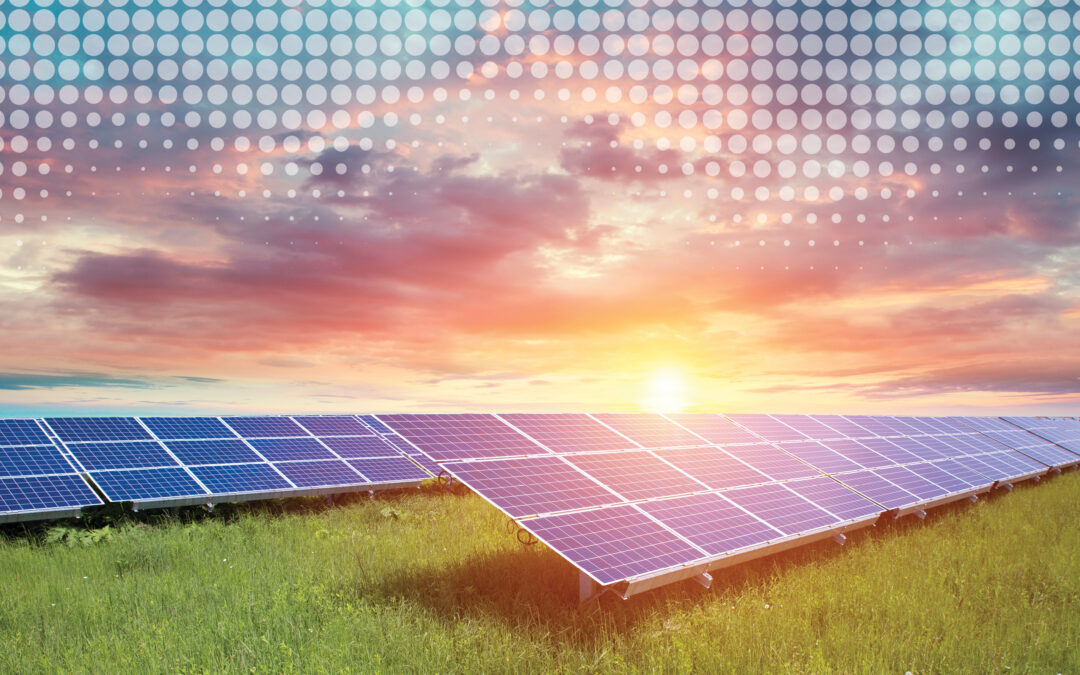
by Andrew Kell | Dec 27, 2022 | Electric Vehicles, Electrification, Energy Storage, Health, Netzero Wisconsin, Renewables, Solar, Wind
This past year, a Project Team consisting of RENEW Wisconsin, Clean Wisconsin, and GridLab commissioned Evolved Energy Research and Cambridge Econometrics to provide modeling, analysis, and reporting for a Wisconsin Zero Carbon Study. The recently released Summary Report provides an excellent overview of the Study results and policy recommendations. This RENEW blog provides additional context and insight into the next steps.
The Technical Report, titled Achieving 100% Clean Energy in Wisconsin, was completed this past summer and provides a first-of-its-kind, economy-wide modeling approach to envision a Wisconsin transition to a zero-carbon future by 2050. The modeling included 1) a baseline scenario as a comparison reference, 2) a 100% Clean Electricity scenario, 3) a Net Zero Economy-wide scenario (also referred to as NZEW), and four additional sub-scenarios that envisioned the NZEW scenario with policy and economic constraints. With NZEW by 2050 as a base assumption, these sub-scenarios further explored scenarios including a) No Transmission Expansion, b) Accelerated Clean Electricity, c) Delayed Action (of electric vehicle and building electrification), and d) Limited Coal and Gas.
The modeling results show a viable zero-carbon future by 2050, but it is a future that requires collaborative planning, supporting policies, and economy-wide investments.
A Grid Evolution
Wisconsin’s current resource portfolio relies heavily on fossil fuel-generating capacity. The figure below, which provides the baseline 2022 capacity assumptions from the model, shows that about 70% of Wisconsin’s current generating capacity relies on coal or fossil gas as fuel sources.
The following pie chart is listed in Gigawatts (GW).
In order to achieve a carbon-free future, clearly existing fossil fuel-generating capacity needs to be replaced with clean energy resources. However, when contemplating the decarbonization of all sectors of the economy, there also needs to be an expansion of generating capacity to serve Wisconsin’s electricity needs by 2050 – a lot more clean energy capacity.
Modeling of the NZEW scenario estimates that when Wisconsin decarbonizes the transportation, building, and other sectors, electricity use will increase by over 160% by 2050, well over doubling Wisconsin’s demand for electricity. Electrification of these sectors is often referred to as ‘beneficial electrification’ as the transition implies moving away from fossil fuels to decarbonized electricity as a fuel source.
To be truly beneficial, the timing of electric vehicle (EV) charging will be essential for load balancing and efficient use of utility infrastructure. This way, while overall electricity usage goes up dramatically, price signals, automatic controls, and utility programs will all allow EVs to charge optimally throughout the year. Currently, it is most economical to charge EVs at night when prices are low. In the future, it may also make sense to send signals to charge during peak solar production during the summer noontime.
The figure below illustrates the capacity expansion needed on the supply side to meet electricity demand growth.
As a result of decarbonization of the grid and beneficial electrification, Wisconsin's demand for electricity in 2050 would be supplied by an estimated 31 Gigawatts (GW) of solar, 21 GW of wind, 7 GW of storage, 7 GW of clean gas, 2 GW hydrogen electrolyzer capacity, and 3 GW of dual fuel electric industrial boilers located in Wisconsin. Of the 31 GW of solar, the model assumed about 2.5 GW would come from rooftop solar based on information from a solar rooftop potential study. Utilities would need to import additional clean energy capacity from outside Wisconsin. The model estimated that imported clean energy would come from about 9.3 GW of solar and 6.3 GW of wind from out-of-state resources.
The figure below provides a snapshot of the clean generation portfolio serving Wisconsin by 2050 under the Net Zero Economy-wide modeling results.
The following pie chart is listed in Gigawatts (GW).
Utility-scale clean energy resources at this scale also require the expansion of transmission investments. For each of Wisconsin’s interties with Minnesota, Iowa, and Illinois, the model estimates that 6 GW of transmission interties are needed for each of these three state interties. This equates to 18 GW of new transmission interties, which is about 3-to-4 times the amount of current Wisconsin transmission interties.
While gas capacity remains in all scenarios, gas serves as a reliability resource operating at just a 5% capacity factor and burning entirely clean, carbon-neutral fuels. In the ‘Limited Coal and Gas’ scenario, existing and less efficient gas units must remain online much longer and operate at much higher capacity factors because new, more efficient gas units are not allowed in this scenario.
In the ‘No Transmission Expansion’ scenario, in-state clean energy resources would have to expand by about 36% above the Net Zero Economy-wide scenario. In this scenario, all new generation capacity must be developed in Wisconsin, as higher capacity factor resources in other states cannot serve Wisconsin’s electricity needs. This scenario would also necessitate the expansion of ‘intrastate transmission’ within the borders of Wisconsin and add $1 billion in costs above the NZEW scenario.
Taking Emissions Down to Zero
In relation to a baseline scenario, the 100% Clean Electricity scenario will reduce total economy-wide carbon emissions by 24% by 2050. In this scenario, while the grid becomes carbon-free, transportation, building, and other sectors realize only modest decarbonization and still rely on fossil fuels to power cars, homes, and some industrial processes.
It is important to note that concentrating on the decarbonization of the electric grid by 2050 alone only gets Wisconsin to about a quarter of all reductions needed for a carbon-free future across all sectors of the economy. Additionally, in the Net Zero scenario, carbon sequestration and bunkering measures are needed to reduce emissions that come from marginal fossil gas resources. By 2050, a small segment of industries will still emit carbon, either because it is too costly to do otherwise or not technically feasible to eliminate completely. To achieve the target of zero emissions by 2050, the model chooses to rely on carbon sequestration, in which carbon is captured before being released into the atmosphere and then piped via pipeline to appropriate geologic sequestration areas in the country, safely sequestering the carbon.
A Real Benefits Plan
Following the Technical Report, Cambridge Econometrics released a report on The Economic Impacts of Decarbonization in Wisconsin. In combination with health outcomes modeled by Evolved Energy Resources, benefits of the Net Zero Economy-wide scenario include:
- $2 to $4.4 billion in avoided healthcare costs in 2050,
- 28 to 63 fewer deaths per million people from air pollution by 2050,
- 3% growth in Wisconsin’s Gross State Product by 2050, adding around $16 billion to Wisconsin’s economy,
- 68,000 additional Wisconsin jobs, and
- Lower energy costs for Wisconsin’s residents.
The benefits of a zero-carbon future outweigh the costs of the transition per the modeling results. Focusing on energy costs alone, economy-wide investments in renewable resources, heat pumps, EVs, etc., increase by about $111.1 billion in present value. However, the benefits of avoiding fossil fuel costs are about $110.6 billion in present value. When you add the health and economic growth benefits listed above, the net-zero investment makes sense from a business case perspective.
Jenna Greene, RENEW’s Energy Policy Fellow, is currently performing a cost-benefit analysis of the modeled scenarios using the Technical Report and Economic Impacts Report results. When cost-benefit results are available, this blog will be updated.
How We Get There
The transition to a zero-carbon future won’t be easy, as infrastructure build-out, technological innovation, and market development will be needed over the next few decades. As a result, we will need to form public-private partnerships, enact and implement policies, and design cross-sector planning processes that support this transition to ensure it is cost-effective. For quick reference, below is a set of key recommendations from a figure on page 19 of the Summary Report. A complete list of policy actions is provided at the conclusion of the Summary Report.
The release of our Zero Carbon Study is just the start of a dialog on how Wisconsin can reach zero carbon emissions by 2050. The Project Team is further collaborating with partners, businesses, legislators, and state and local government officials on the next steps. For further information, please contact Andrew Kell, Policy Analyst at RENEW Wisconsin, at andrew@renewwisconsin.org.



